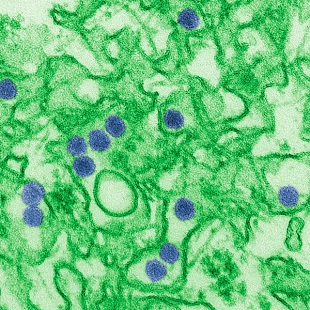 Zika virus particles (blue) WIKIMEDIA, CDC, CYNTHIA GOLDSMITHThe Zika virus may pass from a pregnant woman to her developing fetus via placental immune cells known as Hofbauer cells, according to a study published last week (May 27) in Cell Host & Microbe. The findings highlight a possible transmission route for the virus, which has been linked to microcephaly and other birth defects in more than a quarter of babies born to infected mothers.
Zika virus particles (blue) WIKIMEDIA, CDC, CYNTHIA GOLDSMITHThe Zika virus may pass from a pregnant woman to her developing fetus via placental immune cells known as Hofbauer cells, according to a study published last week (May 27) in Cell Host & Microbe. The findings highlight a possible transmission route for the virus, which has been linked to microcephaly and other birth defects in more than a quarter of babies born to infected mothers.
“Our study indicates that this cell type may be a target for Zika virus in the placenta,” study coauthor Rana Chakraborty of Emory University School of Medicine said in a statement. “Replication in these cells may allow the virus to cross the placental barrier and enter the fetal circulation.”
Until now, the path of the virus from mother to fetus has remained elusive. In fact, some cells in the outermost cell layer of the placenta have been shown to be fairly resistant to Zika infection and may even act as a barrier to transmission.
In the present study, the team used human placentae from five donors to identify Hofbauer cells as particularly vulnerable to Zika infection. Cells called cytotrophoblasts present in the middle layer of ...




















